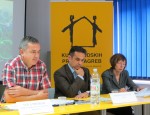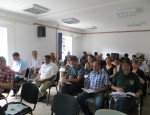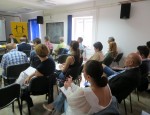Zagreb, 01.07.2014.
On July 1st 2014 the round table Civic Monitoring of Regional Housing Programme with Special Focus on Providing Housing for Members of Roma Community was held in Zagreb at the House of Human Rights. The Round table was organized within the framework of the project Integrating Roma Interest to the Sarajevo Housing Process, supported by the Foundation Open Society Institute from Budapest. Participants of the round table were representatives of competent governmental institutions, Roma organizations, international community and local CSOs.  The participants were addressed by Zoran Pusic, Co-president of the Igman Initiative for Croatia and President of the Civic Committee for Huma Rights, who highlighted that it is important for non-governmental institutions, such as the Igman Initiative, to monitor the implementation of the Regional Housing Programme (RHP) and alert competent institutions about the discrepancies between the theory and practice, i.e. between whathas been written and what is really happening in the area of protection of human rights. Aleksandar Popov, Co-president of the Igman Initiative for Serbia and Coordinator of the Project Integrating Roma Interest to the Sarajevo Housing Process, presented to the participants the Project, planned activities and expected results. He emphasized that, even though twenty years have pass since the wars, numerous status and property issues of the citizens of the four countries have not been resolved yet, and that this particular problems affects the refugee population the most. On November 7th 2011 the Ministerial Conference focused on providing solutions to the refugee issue in the Balkans was held in Belgrade and followed by the Donors Conference on April 24th in Sarajevo, on the occasion of which the majority of financial means necessary for the implementation of th RHP were secured. Among potential beneficiaries of the RHP are also the members of Roma community, who face the problem in proving their refugee status as they don’t have appropriate documents.
The participants were addressed by Zoran Pusic, Co-president of the Igman Initiative for Croatia and President of the Civic Committee for Huma Rights, who highlighted that it is important for non-governmental institutions, such as the Igman Initiative, to monitor the implementation of the Regional Housing Programme (RHP) and alert competent institutions about the discrepancies between the theory and practice, i.e. between whathas been written and what is really happening in the area of protection of human rights. Aleksandar Popov, Co-president of the Igman Initiative for Serbia and Coordinator of the Project Integrating Roma Interest to the Sarajevo Housing Process, presented to the participants the Project, planned activities and expected results. He emphasized that, even though twenty years have pass since the wars, numerous status and property issues of the citizens of the four countries have not been resolved yet, and that this particular problems affects the refugee population the most. On November 7th 2011 the Ministerial Conference focused on providing solutions to the refugee issue in the Balkans was held in Belgrade and followed by the Donors Conference on April 24th in Sarajevo, on the occasion of which the majority of financial means necessary for the implementation of th RHP were secured. Among potential beneficiaries of the RHP are also the members of Roma community, who face the problem in proving their refugee status as they don’t have appropriate documents.
Mr. Popov also mentioned the case of Montenegro where inadequate housing was provided for Roma refugees, i.e. apartment units were built for Roma refugees, which they refused as it didn’t fit their lifestyle and met their genuine needs. The main problem in Serbia is that the public calls to apply for housing with the RHP did not reach members of Roma community, which is one of the main issues related to the implementation of the RHP in Serbia.
After those two introductory speeches the Igman Initiative expert for Croatia Dubravka Miskovic-Prodanovic presented the results of her research in Croatia and provided the assessment of legal framework related to finding solutions to the issues of Roma population in Croatia. In April 2014 the Croatian authorities adopted the Strategy for Combating Poverty and Social Exclusion, which emphasized that the refugees and Roma are the most vulnerable groups. Unfortunately, there are no regulations which would be specifically related to providing housing for socially disadvantaged citizens. The only regulation referring to that issue is the Law on Areas of Special State Concern. According to this Law housing was provided for 105 Roma families, even though the Law does not indicate in which areas the housing was provided. Within the RHP housing is firstly being provided for the persons who are still placed in collective centers and who are the holders of tenancy rights. However, it is not clear whether among them there are members of Roma community. According to the Strategy for Roma Inclusion every county should adopt its own strategy for including Roma families into the housing programs. Mrs. Miskovic-Prodanovic also highlighted that Roma should be encouraged to apply for the eligibility to be put on the housing lists, the public calls for which are open until 31st of March, and that they should be given assistance in gathering all necessary documentation.
 Mario Pavlovic, representative of the UNHCR, presented the RHP and explained that the basic criteria for the beneficiaries of the RHP in Croatia is to meet the criteria of vulnerability of the UNHCR, which implies that they do not have a housing unit which they can inhabit and that they have been the victims of displacement from 1991 to 1995. However, it is not necessary that they submit the documents proving their status of refugee, displaced person or exile. In Croatia there is also the National Housing Program which started in 1998. The Law on Areas of Special State Concern is the basic law under which the National Housing Program is being implemented. In those areas (of special state concern) the persons have the rights to submit their application for housing regardless of their status (refugee, displaced person or exile). Mr. Pavlovic pointed out that the main issue is that required documentation is expensive to be provided and that there are unnecessary items on the list of requirements, such as the verification of residence during the time of exile. RHP has stricter criteria than the National Housing Program, i.e. the definition of the final beneficiaries is narrowed down. Ivica Preskar from State Office for Reconstruction and Housing Care pointed out that from 2001 till 2012 the Office had collected 70,000 applications, of which 36,000 have been provided with housing by the end of 2012. The RHP in Croatia has access to 10.9 million dollars. Ibrahim Gusani, President of the National Coordination of the Roma National Minority Council in Croatia, stressed that this is a painful subject matter, however, very important for all Roma in Croatia. The main issue is the lack of information on the part of legitimately elected Roma representatives in Croatia. He called on all institutions to cooperate more with Roma organization as members of Roma community do not know whom to turn for help and assistance.
Mario Pavlovic, representative of the UNHCR, presented the RHP and explained that the basic criteria for the beneficiaries of the RHP in Croatia is to meet the criteria of vulnerability of the UNHCR, which implies that they do not have a housing unit which they can inhabit and that they have been the victims of displacement from 1991 to 1995. However, it is not necessary that they submit the documents proving their status of refugee, displaced person or exile. In Croatia there is also the National Housing Program which started in 1998. The Law on Areas of Special State Concern is the basic law under which the National Housing Program is being implemented. In those areas (of special state concern) the persons have the rights to submit their application for housing regardless of their status (refugee, displaced person or exile). Mr. Pavlovic pointed out that the main issue is that required documentation is expensive to be provided and that there are unnecessary items on the list of requirements, such as the verification of residence during the time of exile. RHP has stricter criteria than the National Housing Program, i.e. the definition of the final beneficiaries is narrowed down. Ivica Preskar from State Office for Reconstruction and Housing Care pointed out that from 2001 till 2012 the Office had collected 70,000 applications, of which 36,000 have been provided with housing by the end of 2012. The RHP in Croatia has access to 10.9 million dollars. Ibrahim Gusani, President of the National Coordination of the Roma National Minority Council in Croatia, stressed that this is a painful subject matter, however, very important for all Roma in Croatia. The main issue is the lack of information on the part of legitimately elected Roma representatives in Croatia. He called on all institutions to cooperate more with Roma organization as members of Roma community do not know whom to turn for help and assistance.  Nedjatin Kamberovski, President of the Roma National Minority Council for the Municipality of Zagreb, pointed out that for the beneficiaries to apply within certain programs they have to be declared members of Roma community, however, there is no statistical data drawn up according to the nationality of beneficiaries. He also mentioned that legitimately elected representatives of Roma community are strip of their legitimacy at national level. Mario Pavlovic, representative of the UNHCR, asked the participants who are the representatives of the Roma community to seek information from and cooperate with relevant CSOs, such as Information and Legal Assistance Center (IPC) from Slavonski Brod, which provide legal aid to Roma and can provide help with gathering required documentation. Natasa Kovacevic from IPC Slavonski Brod has stated that to this point in time they only had one request regarding RHP. Aleksa Djokic from the Office for Human Rights and Rights of Minorities stated that the access to all necessary information is not complicated and that gathering all necessary documentation shouldn’t be an issue. He gave the example of the UNDP in Croatia, which made the atlas of Roma communities in Medjimurje County, which they plan to make for the entire Croatia. According to the above mentioned discussion the conclusions from the Round table have been drawn as follows: 1. One of the main problems is that the public calls to apply for housing with the RHP do not reach members of Roma community in the sense of inefficient access to information and providing relevant information in atimely manner, which is also one of the main issues related to the implementation of the RHP. 2. There are no regulations which would be specifically related to providing housing for socially disadvantaged citizens 3. Required documentation is expensive to be provided and there are unnecessary items on the list of requirements, such as the verification of residence during the time of exile. 4. Roma refugees should be provided with free legal aid as well as assistance in obtaining all necessary documents in order to apply for eligibility with the RHP. 5. Legitimately elected representatives of Roma community are strip of their legitimacy at national level. 6. One of the main issues is the lack of information on the part of legitimately elected Roma representatives in Croatia.
Nedjatin Kamberovski, President of the Roma National Minority Council for the Municipality of Zagreb, pointed out that for the beneficiaries to apply within certain programs they have to be declared members of Roma community, however, there is no statistical data drawn up according to the nationality of beneficiaries. He also mentioned that legitimately elected representatives of Roma community are strip of their legitimacy at national level. Mario Pavlovic, representative of the UNHCR, asked the participants who are the representatives of the Roma community to seek information from and cooperate with relevant CSOs, such as Information and Legal Assistance Center (IPC) from Slavonski Brod, which provide legal aid to Roma and can provide help with gathering required documentation. Natasa Kovacevic from IPC Slavonski Brod has stated that to this point in time they only had one request regarding RHP. Aleksa Djokic from the Office for Human Rights and Rights of Minorities stated that the access to all necessary information is not complicated and that gathering all necessary documentation shouldn’t be an issue. He gave the example of the UNDP in Croatia, which made the atlas of Roma communities in Medjimurje County, which they plan to make for the entire Croatia. According to the above mentioned discussion the conclusions from the Round table have been drawn as follows: 1. One of the main problems is that the public calls to apply for housing with the RHP do not reach members of Roma community in the sense of inefficient access to information and providing relevant information in atimely manner, which is also one of the main issues related to the implementation of the RHP. 2. There are no regulations which would be specifically related to providing housing for socially disadvantaged citizens 3. Required documentation is expensive to be provided and there are unnecessary items on the list of requirements, such as the verification of residence during the time of exile. 4. Roma refugees should be provided with free legal aid as well as assistance in obtaining all necessary documents in order to apply for eligibility with the RHP. 5. Legitimately elected representatives of Roma community are strip of their legitimacy at national level. 6. One of the main issues is the lack of information on the part of legitimately elected Roma representatives in Croatia.

